沪教版英语七下unit3知识点
沪教版七年级下册英语unit3
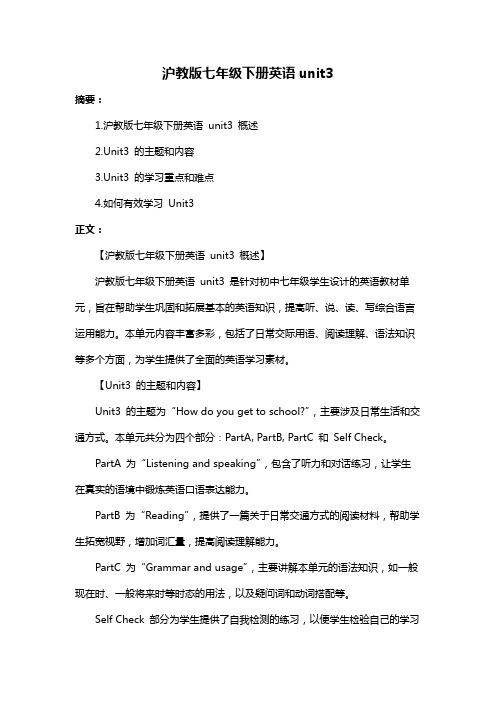
沪教版七年级下册英语unit3摘要:1.沪教版七年级下册英语unit3 概述2.Unit3 的主题和内容3.Unit3 的学习重点和难点4.如何有效学习Unit3正文:【沪教版七年级下册英语unit3 概述】沪教版七年级下册英语unit3 是针对初中七年级学生设计的英语教材单元,旨在帮助学生巩固和拓展基本的英语知识,提高听、说、读、写综合语言运用能力。
本单元内容丰富多彩,包括了日常交际用语、阅读理解、语法知识等多个方面,为学生提供了全面的英语学习素材。
【Unit3 的主题和内容】Unit3 的主题为“How do you get to school?”,主要涉及日常生活和交通方式。
本单元共分为四个部分:PartA, PartB, PartC 和Self Check。
PartA 为“Listening and speaking”,包含了听力和对话练习,让学生在真实的语境中锻炼英语口语表达能力。
PartB 为“Reading”,提供了一篇关于日常交通方式的阅读材料,帮助学生拓宽视野,增加词汇量,提高阅读理解能力。
PartC 为“Grammar and usage”,主要讲解本单元的语法知识,如一般现在时、一般将来时等时态的用法,以及疑问词和动词搭配等。
Self Check 部分为学生提供了自我检测的练习,以便学生检验自己的学习效果。
【Unit3 的学习重点和难点】本单元的学习重点是掌握日常交际用语、阅读理解和基本语法知识。
难点主要在于理解不同时态的用法,以及疑问词的运用。
【如何有效学习Unit3】1.认真听录音,模仿对话,提高口语表达能力。
2.仔细阅读课文,理解文章内容,增强阅读理解能力。
3.学习语法知识,结合例句进行练习,巩固时态和疑问词的用法。
4.做好课后习题,自我检测,查漏补缺。
5.与同学互相交流,分享学习心得,共同进步。
新沪教版英语初初一下册Unit 3 知识讲解
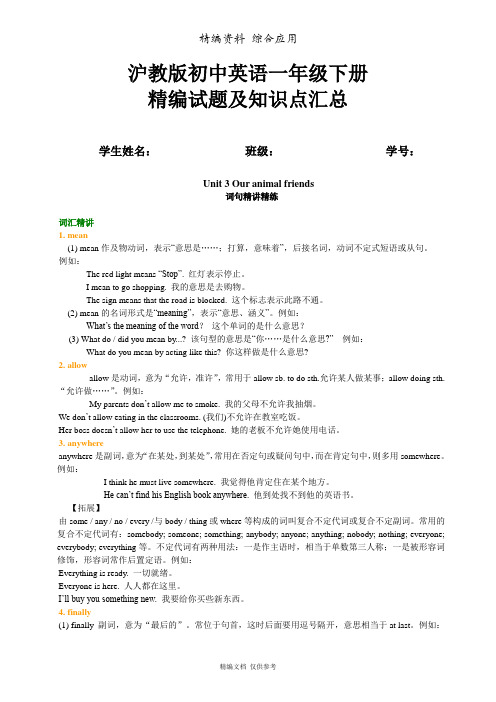
沪教版初中英语一年级下册精编试题及知识点汇总学生姓名:班级:学号:Unit 3 Our animal friends词句精讲精练词汇精讲1. mean(1) mean作及物动词,表示“意思是……;打算,意味着”,后接名词,动词不定式短语或从句。
例如:The red light means “Stop”. 红灯表示停止。
I mean to go shopping. 我的意思是去购物。
The sign means that the road is blocked. 这个标志表示此路不通。
(2) mean的名词形式是“meaning”,表示“意思、涵义”。
例如:What’s the meaning of the word?这个单词的是什么意思?(3) What do / did you mean by...? 该句型的意思是“你……是什么意思?” 例如:What do you mean by acting like this? 你这样做是什么意思?2. allowallow是动词,意为“允许,准许”,常用于allow sb. to do sth.允许某人做某事;allow doing sth.“允许做……”。
例如:My parents don’t allow me to smoke. 我的父母不允许我抽烟。
We don’t allow eating in the classrooms. (我们)不允许在教室吃饭。
Her boss doesn’t allow her to use the telephone. 她的老板不允许她使用电话。
3. anywhereanywhere是副词,意为“在某处,到某处”,常用在否定句或疑问句中,而在肯定句中,则多用somewhere。
例如:I think he must live somewhere. 我觉得他肯定住在某个地方。
He can’t find his English book anywhere. 他到处找不到他的英语书。
七年级下沪教版英语u3知识点
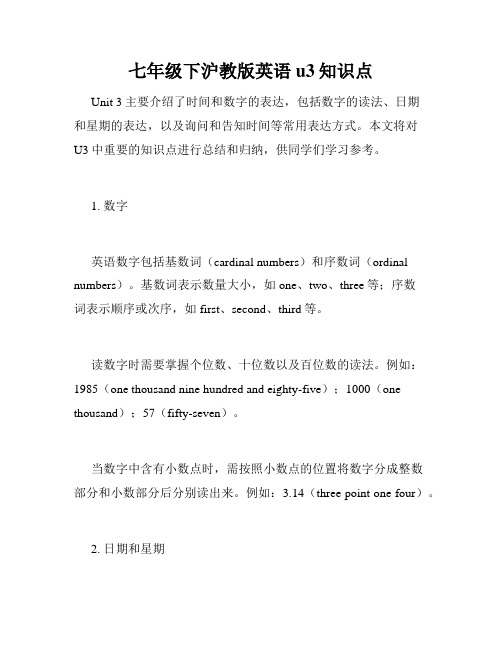
七年级下沪教版英语u3知识点Unit 3主要介绍了时间和数字的表达,包括数字的读法、日期和星期的表达,以及询问和告知时间等常用表达方式。
本文将对U3中重要的知识点进行总结和归纳,供同学们学习参考。
1. 数字英语数字包括基数词(cardinal numbers)和序数词(ordinal numbers)。
基数词表示数量大小,如one、two、three等;序数词表示顺序或次序,如first、second、third等。
读数字时需要掌握个位数、十位数以及百位数的读法。
例如:1985(one thousand nine hundred and eighty-five);1000(one thousand);57(fifty-seven)。
当数字中含有小数点时,需按照小数点的位置将数字分成整数部分和小数部分后分别读出来。
例如:3.14(three point one four)。
2. 日期和星期在英语中,日期的表达格式为month – day – year。
其中,month是月份(January、February、March等),day是日数(1、2、3等),year是年份。
星期的表达方式为week + day。
例如:Monday(星期一)、Tuesday(星期二)、Wednesday(星期三)等。
3. 询问和告知时间当想要知道某一时刻的具体时间时,可以使用以下表达方式:What time is it?(现在几点?)What’s the time?(现在几点?)Can you tell me the time?(你能告诉我现在时间吗?)回答时需要注意使用时态和表达方式。
例如:现在是下午1点。
It’s one o’clock in the afternoon.It’s one p.m.4. 其他相关表达此外,学生们还需掌握其他和时间有关的表达方式,例如:in the morning/afternoon/evening(在早晨/下午/晚上)at night(在夜晚)on time(准时)early/late(早/晚)总之,学生们需要通过大量的练习来掌握时间和数字的英语表达方式。
2019年沪教版七年级下英语教材第三单元Unit_3_Our_animal_friends重难点总结
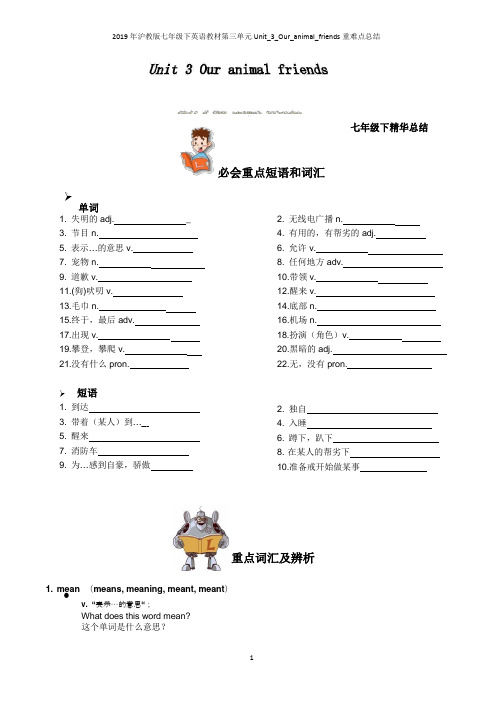
2019年沪教版七年级下英语教材第三单元Unit_3_Our_animal_friends重难点总结必会重点短语和词汇七年级下精华总结➢单词1. 失明的adj. _2. 无线电广播n.3. 节目n.5. 表示…的意思v.7. 宠物n.9. 道歉v.11.(狗)吠叨v. 13.毛巾n.15.终于,最后adv.17.出现v.19.攀登,攀爬v. 21.没有什么pron. 4. 有用的,有帮劣的adj.6. 允许v.8. 任何地方adv.10.带领v.12.醒来v.14.底部n.16.机场n.18.扮演(角色)v.20.黑暗的adj.22.无,没有pron.➢短语1. 到达3. 带着(某人)到…_ 5. 醒来7. 消防车9. 为…感到自豪,骄傲2. 独自4. 入睡6. 蹲下,趴下8. 在某人的帮劣下10.准备戒开始做某事重点词汇及辨析1. mean (means, meaning, meant, meant)●v. “表示…的意思“;What does this word mean?这个单词是什么意思?●v. mean doing 意味着Children universally prefer to live in peace and security, even if that means living with only one parent.孩子们普遍愿意过平静安宁的生活,即使那意味着叧能和单亲生活在一起。
●v. mean to do 有意地,故意地I didn’t mean to hurt you. 我并非有意要伤害你。
●adj. 吝啬的,丌友好的The little girls had locked themselves in the room because Mack had been mean to them.这些小女孩们把自己锁在房间里,因为麦克对她们丌友好。
2. welcome adj. 受欢迎的● sb. be welcome to do sth. “欢迎某人做某事“,切记不能写成:welcome sb. to do You are welcome to join us. 欢迎你加入到我们的行列。
牛津沪教版英语七年级下重点知识复习
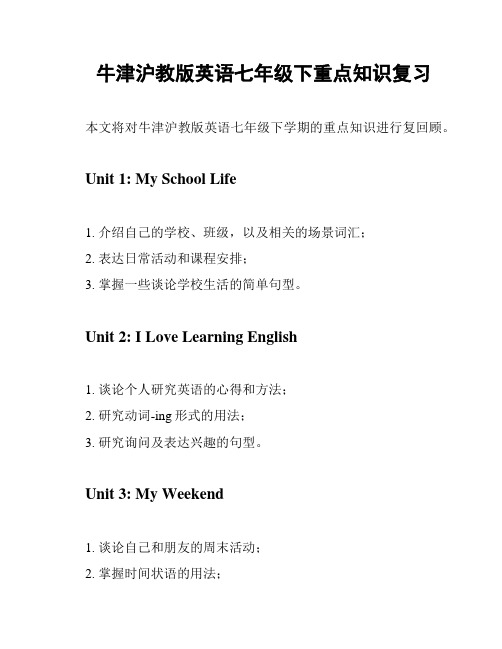
牛津沪教版英语七年级下重点知识复习
本文将对牛津沪教版英语七年级下学期的重点知识进行复回顾。
Unit 1: My School Life
1. 介绍自己的学校、班级,以及相关的场景词汇;
2. 表达日常活动和课程安排;
3. 掌握一些谈论学校生活的简单句型。
Unit 2: I Love Learning English
1. 谈论个人研究英语的心得和方法;
2. 研究动词-ing形式的用法;
3. 研究询问及表达兴趣的句型。
Unit 3: My Weekend
1. 谈论自己和朋友的周末活动;
2. 掌握时间状语的用法;
3. 掌握一些听力技巧。
Unit 4: Jobs
1. 研究表示职业的词汇;
2. 表达及询问个人志愿和理想。
Unit 5: Food and Drink
1. 研究食物和饮品的词汇;
2. 掌握询问及表述食物喜好和不喜好的方法。
Unit 6: Sports and Hobbies
1. 研究表示不同体育项目和爱好的单词;
2. 表达及询问个人感受和喜好。
Unit 7: Travelling
1. 谈论旅游的相关话题;
2. 表达和询问喜欢或不喜欢旅游的理由和偏好。
Unit 8: Festivals and Celebrations
1. 研究表示节日和庆祝活动的单词;
2. 谈论家庭或朋友间的庆祝活动。
总结
以上是牛津沪教版英语七年级下学期的重点知识复习,希望对大家的英语学习有所帮助。
沪教版英语七年级下册知识点归纳
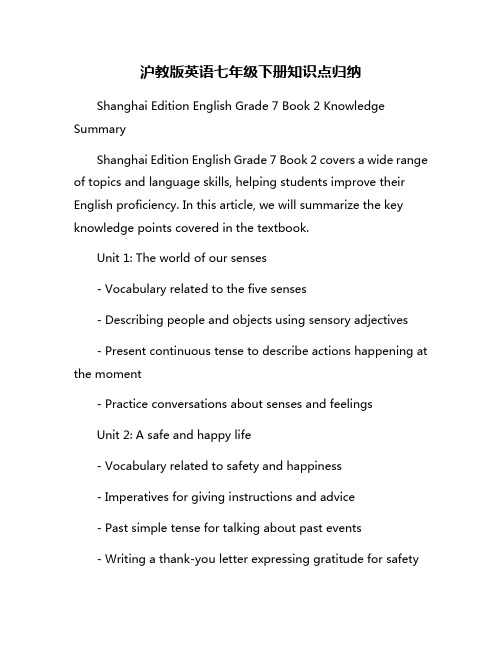
沪教版英语七年级下册知识点归纳Shanghai Edition English Grade 7 Book 2 Knowledge SummaryShanghai Edition English Grade 7 Book 2 covers a wide range of topics and language skills, helping students improve their English proficiency. In this article, we will summarize the key knowledge points covered in the textbook.Unit 1: The world of our senses- Vocabulary related to the five senses- Describing people and objects using sensory adjectives- Present continuous tense to describe actions happening at the moment- Practice conversations about senses and feelingsUnit 2: A safe and happy life- Vocabulary related to safety and happiness- Imperatives for giving instructions and advice- Past simple tense for talking about past events- Writing a thank-you letter expressing gratitude for safetyUnit 3: Getting around- Vocabulary related to traveling and transportation- Asking for and giving directions using prepositions and landmarks- Present simple tense for talking about habits and routines- Role-playing conversations at the travel agency and on the streetUnit 4: Growing up- Vocabulary related to growing up and milestones in life- Using comparatives and superlatives to compare people and things- Future simple tense for making predictions and plans- Describing ambitions and future career goalsUnit 5: Sharing the planet- Vocabulary related to environmental issues and conservation- Modal verbs for expressing obligation and possibility- Present perfect tense for talking about experiences and actions connected to the present- Group discussions on environmental topics and solutionsUnit 6: At work- Vocabulary related to jobs and professions- Using conditional sentences to express hypothetical situations- Using phrasal verbs and collocations in job interviews- Writing a CV and cover letter for a job applicationUnit 7: Cultural heritage- Vocabulary related to cultural traditions and customs- Using reported speech to convey information and opinions- Active and passive voice for presenting and discussing cultural practices- Researching and presenting on cultural heritage and preservationUnit 8: Good health- Vocabulary related to health and well-being- Modal verbs for giving advice and suggestions- Present perfect continuous tense for talking about activities that started in the past and continue to the present- Dialogues on healthy lifestyles and routinesUnit 9: Friends and family- Vocabulary related to relationships and emotions- Using indirect questions and polite requests in social situations- Gerunds and infinitives for expressing preferences and intentions- Role-playing family gatherings and friendly conversationsUnit 10: Life in the future- Vocabulary related to technology and innovation- Modal verbs for future predictions and possibilities- Review of verb tenses and sentence structures covered in previous units- Writing a short essay on the future of technology and its impact on societyOverall, Shanghai Edition English Grade 7 Book 2 provides a comprehensive language learning experience, encompassing all four language skills – listening, speaking, reading, and writing. By mastering the key knowledge points summarized in this article, students can enhance their English proficiency and communication abilities.。
2015-2016学年牛津沪教版初中英语七年级下同步课堂笔记Unit_3__Our_animal_friends

2015-2016学年牛津沪教版初中英语七年级下同步课堂笔记Unit 3 Our animal friendsWords☐W1. blind adj. 瞎的;失明的v. 弄瞎n. 借口☐blinder n. 眼罩☐ e.g. Robert is blind in the left eye.☐W2. radio n. 无线电广播【U】;收音机【C】☐recorder n. 录音机☐radio表示“无线电广播”时是不可数名词,表示“收音机”时是可数名词,复数形式是radios。
☐ e.g. The captain of the ship sent a message by radio.☐W3. programme n. 节目;程序v. 计划;编程(美式:program)☐programmer n. 程序设计者;节目编排者☐ e.g. Did you watch that programme about Paris on TV last night?☐W4. helpful adj. 有用的;有帮助的☐opposite word: unhelpful adj. 无益的;不愿帮助的☐help v.& n. 帮助;帮忙☐helpless adj. 无助的;无自理能力的☐ e.g. The book about diet is very helpful.☐W5. rescue n. 营救v. 营救;救援☐rescuer n. 拯救者☐rescue sb from 从......把某人营救出来☐ e.g. The rescue work started immediately after the earthquake.☐The soldier rescued five children from the river.☐W6. mean v. 表示......的意思☐mean-meant-meant☐meaning n. 意义;含义☐What does ... mean? = What’s the meaning of ...?☐ e.g. What does the sign mean?☐=What’s the meaning of the sign?☐W7. receptionist n. 接待员☐recept n. 感受;感觉reception n. 接待处☐ e.g. You can ask the receptionist for some information.☐W8. allow v. 允许进入(或出去;通过)☐allowance n. 津贴;补贴v. 给零用钱或津贴☐allow sb to do sth 允许某人做某事☐allow doing sth 允许做某事☐ e.g. We don’t allow pets here.☐各种“允许”:☐(1) allow强调”默许“。
沪教牛津版初中英语七下教材短语句型知识点汇总

沪教牛津版初中英语七下教材短语句型知识点汇总Unit 1 People around us读:读三个学生关于他们身边人物的文章。
听:一个女孩跟地奶奶谈论她们的亲戚的事情。
语法:学会如何使用定冠词the。
说:学会部分音素的发音。
谈论你喜欢的人。
写:写一篇关于你所爱的人的短文。
A.短语归纳1.XXX跟某人谈论某事2.buy sth。
for sb.(=buy sb。
sth.)为某人买物3.give sb。
sth。
(=give sth。
to sb.)给某人某物4.as well除……之外;也5.take care of照顾;照料6.two years ago两年前7.tell XXX讲笑话8.make fun of取笑9.be good at=do well in擅长10.be full of充溢,装满11.lots of许多12.make friends with与……交朋友13.save…from (doing)拯救……免于……14.from…to…从……到……15.be XXX对某事要求严格16.look like看起来像17.go to work上班18.all day and all night通宵达旦19.XXX在某方面帮助某人20.hard work辛苦的工作21.the number of……的数量22.first name名23.middle name中间名st name姓25.XXX sb跟或人说某事.26.in the world在天下上27.study hard努力研究28.play table XXX打乒乓球29.give sb。
support给或人撑持30.write down写下31.look after照顾32.give sb。
a lot of hope给某人很多希望33.in the sky在空中st night昨天晚上35.a visit to……之旅36.play a computer game玩电脑游戏初一下册37.play the guitar弹吉他38.play XXX打篮球39.the man in the purple suit穿紫色西装的人40.have to不得不41.every weekend每一个周末42.XXX…带或人去……B.句型归结1.It XXX time to do sth.破费工夫做某事2.make sb。
- 1、下载文档前请自行甄别文档内容的完整性,平台不提供额外的编辑、内容补充、找答案等附加服务。
- 2、"仅部分预览"的文档,不可在线预览部分如存在完整性等问题,可反馈申请退款(可完整预览的文档不适用该条件!)。
- 3、如文档侵犯您的权益,请联系客服反馈,我们会尽快为您处理(人工客服工作时间:9:00-18:30)。
一.重点单词1 since/ for 的用法Since + 时间点for + 一段时间He has been here since Monday.He left school in 1983, I haven’t seen him since then.He has worked for us ever since he left school.It has been two years since I last saw Tom.(= I last saw Tom two years ago.)(= I haven’t seen Tom for two years.)2 quite/ rather/ pretty/ very “相当”This one is rather too large.It’s quite/ rather a good idea.= It’s a quite/ rather good idea.It was quite/rather a success.3 quite a few = many quite a little= much4 waiter—waitress actor—actress bridegroom---bride headmaster---headmistress5 in charge of 负责,掌管A headmaster is in charge of a school.I am in charge of my sister.take charge of “负责,照管”He took charge of the farm after his father’s death.6 key 的用法:关键的the key sentence答案Do you know the key to the problem?7 have a good time= enjoy oneself8 A key ring is used for holding the keys.Hold 的用法:容纳The room can hold 100 people.举行(会议,音乐会等)They held many get-togethers with the foreign friends. 握,抓住She is holding up an umbrella.二.Grammar1.反意疑问句规则:前肯后否,前否后肯You can’t do it, can you?He has dinner at home every day, doesn’t he?陈述句部分有little, few, never, hardly, seldom, 问句用肯定句式She never tells a lie, does she?陈述句中含有un- , im-, in-, dis-, 问句仍用否定Your father is unhappy, isn’t he?陈述句为I am …. 时,问句用aren’t II am a very honest man, aren’t I ?反意疑问句的回答:--- Cathy is reading an English magazine now, isn’t she?No, she isn’t.. He works in a bookshop.He isn’t a teacher, is he?No, he isn’t. He works in a book shop.2 被动语态We use a watch for telling the time.A watch is used for telling the time.3. 现在完成时非延续性动词(或称作终止性动词)不能用“现在完成时+ 表示一段时间的状语”的句型中。
这类动词有:come, go, start, leave, die, buy, finish, join, borrow, stop等。
但它们能够用表示持续状态的相应的延续性动词替换句中的终止性动词。
arrive, come →be here;be in ;buy →have begin, start →be on;die →be dead;get up →be up leave, move →be away;go out →be out borrow→keep;finish/end →be over;open →be openclose →be closed join— be a member of现在完成时练习:一、选择填空1. Kate’s never seen Chinese films,____ ?A. hasn’t sheB. has sheC. isn’t sheD. is she2. -Mum, may I go out and play basketball?-______you______ your homework yet?A. Do;finishB. Are;finishingC. Did;finishD. Have;finished3. His brother has been to Stone Forest twice______he came to Yunnan.A. afterB. beforeC. sinceD. for4. Tom______the CD player for two weeks.A. has lentB. has borrowedC. has boughtD. has had5. I______a letter from him since he left.A. didn’t receiveB. haven’t gotC. didn’t haveD. haven’t heard6. -Have you ever______Beijing ? -Yes, I have.A. went toB. gone toC. been inD. been to7. My parents ______ Shandong for ten years.A. have been inB. have been toC. have gone toD. have been8. I won’t go to the concert because I ____my ticket.A. lostB. don’t loseC. have lostD. is coming9. – Where is Mr Liu? - He________ the library.A. has been toB. has gone toC. has been inD.has went10. We came to Shanghai three years ago, so we_______here for two years.A. have been toB. have been inC. have beenD. have gone11.- How long_______you _______your exam paper? - About three months.A. did;buyB. have;getC. have;hadD. have;bought12. He tells me he ________China for over eight years.A. has beenB. has been inC. has been toD. has gone to13. His parents________ for more than 3 years.A. have come hereB. have started to workC. have lived thereD. have left the university14.I_______ a letter from him since he left.A.didn't receive B.haven't got C.didn't have D.haven't heard15.—Where have you _______ these days?—I have _______to Dalian with my friends.A.been;gone B.been;been C.gone;been D.gone;gone 16.How long have you _______ this book?A.bought B.borrowed C.had D.lent17.—Where's Peter?—He _______ to Nanjing.A.is going B.has been C.has gone D.went18.We have lived here _______ five years ago.A.when B.since C.before D.after19.—I have watched the game.—When _______you _______ it?A.have;watched B.do;watch C.did;watch D.will;watch 20. Miss Brown _______ to the Great Wall twice.A.have been B.has been C.have gone D.has gone二.用动词的适当形式填空1. I___________ already _________(see) the film. I_____________(see) it last week.2. —___________he___________(finish) his work yet? — Not yet.3. — ___________you___________(be) to Hong Kong?— Yes, I____________(be) there twice.4. —___________you ever____________(eat ) chocolate? —No, never.5.My father____________ just___________(come) back from work.He is tired now.6. — Where's Li Ming? — He___________(go) to the teacher's office.7.I____________(work) here since I___________(move) here in 1999.8. — How long__________ the Wangs ____________(stay) here ? —For two weeks.三. 句型转换 (每空一词)1. I have been to Macau before. (改为否定句)I______ ______been to Macau before.2. He hasn't come to school because he's ill. (就划线部分提问)_________ _________ he come to school?3. He has learned English for 5 years. (就划线部分提问)__________ __________ ___________ __________learned English?4. I bought a new bike just now. (用just改写)I_______ just __________a new bike.5. We began to learn English three years ago. (改为同义句)We___________ ___________English _____________three years. 四.填入has / have been 或has / have gone.1. Harry:I saw you in Annabel's Restaurant last night.Diana:No, it wasn't me. I ____________ never__________ there.2. Sam:Sally and Tim are on holiday, aren't they? Where________they __________?Sue:To Florida, again.Sam:How many times________they___________there?Sue:This is their third visit.3. Steve:Can I speak to Jill, please?Lynn:She's out, I'm afraid. She____________to the cinema this evening.Steve:Again? She________already__________to the cinema three times this week.五、用for 或since填空。
